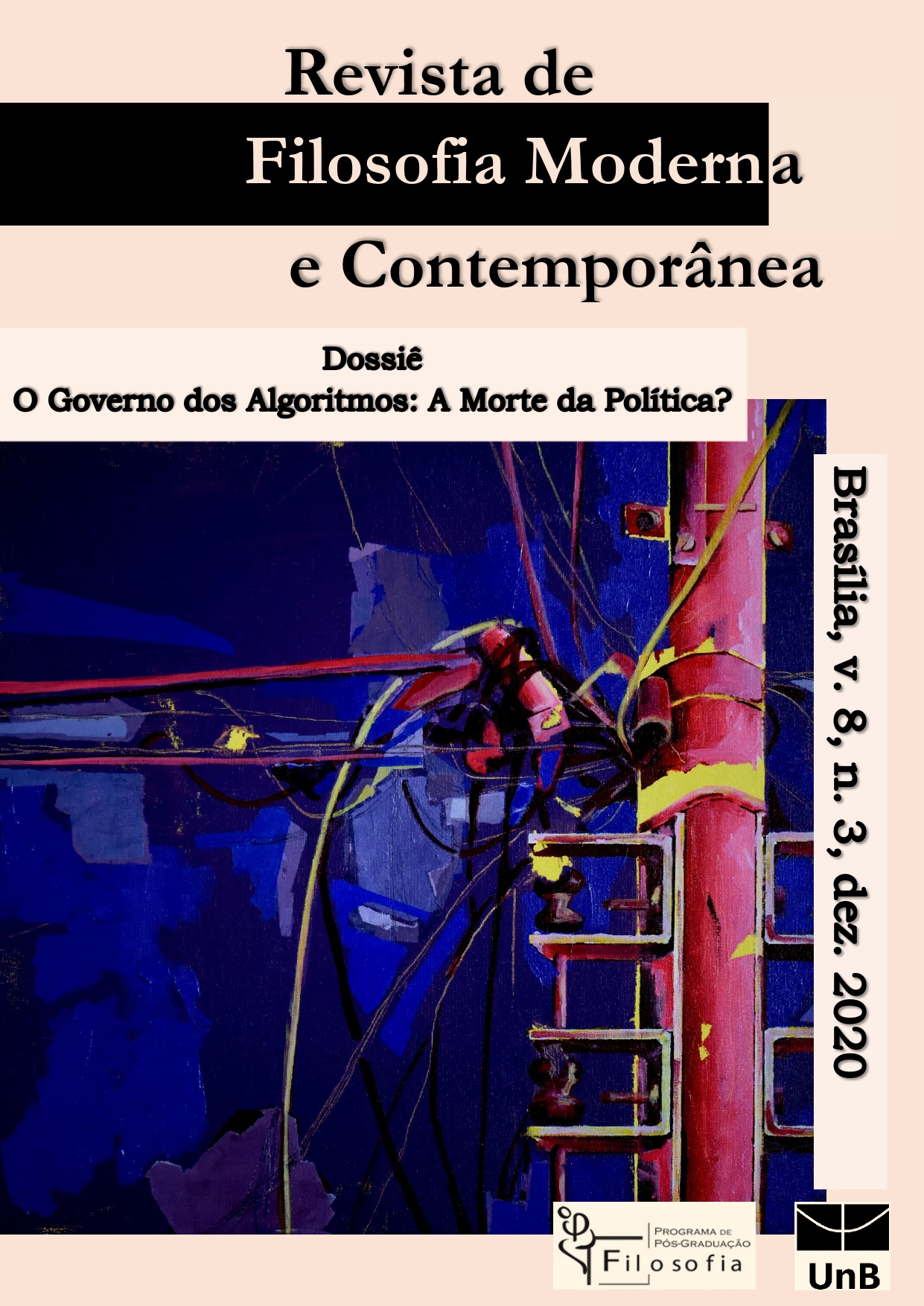The Government of Conducts and the Constitution of Subjectivity
A Study of the Society of Control of Algorithmic Type
DOI:
https://doi.org/10.26512/rfmc.v8i3.34460Keywords:
Governmentality. Algorithm. Big data. Data Science. Control.Abstract
This article starts from the discreet transition between disciplinary societies to control societies, what, in hypothesis, is realized out by the use of surveillance technologies and the production of Big Datas. Based on this premise, the research seeks in the relationship of data and algorithms the conditions for the possibility of an algorithmic governmentality that transforms the subjectivities of individuals into profiles generated by technologies, as a way of understanding society. With this, the study aims to understand how algorithmic governmentality influences the construction of subjective and social reality through communication and information technologies that are fed with data, which soon, through Data Science, becomes something usable in favor of population control. Finally, it is concluded that the future will be increasingly intertwined with the algorithmic control society, and that, we need to be critical of events related to technology, science and society.
Downloads
References
ASSANGE, Julian. Cypherpunks: liberdade e o futuro da internet. (Trad. Cristina Yamagani). São Paulo: Boitempo, 2013.
BRASIL. Decreto 10.046 de 09 de outubro de 2019. Dispõe sobre a governança no compartilhamento de dados no âmbito da administração pública federal. Diário Oficial da União: Brasília, DF. Ed. nº 197, seção 1, pp. 2-5, out. 2019.
BRUNO, Fernanda. Máquinas de ver, modos de ser: vigilância, tecnologia, subjetividade. Porto Alegre: Sulina, 2013.
CARDON, Dominique. A quoi rêvent les algorithmes: nos vies à l’heure des big data. Paris: Le Seuil, 2015.
COMITÊ INVISÃVEL. Aos Nossos Amigos: crise e insurreição. (Trad.: Edições Antipáticas). São Paulo: n-1 Edições, 2016.
CORMEN, Thomas H. Desmistificando algoritmos. (Trad. Arlete Simille Marques). Rio de Janeiro: Elsevier, 2014.
DELEUZE, Gilles. Conversações: 1972-1990. (Trad. Peter Pal Pelbart). São Paulo: Ed. 34, 1992.
EMPOLI, Giuliano da. Os engenheiros do Caos. (Trad. Arnaldo Bloch). São Paulo: Vestígio, 2020.
FIGUEIREDO, Carlos. Algoritmos, subsunção do trabalho, vigilância e controle: novas estratégias de precarização do trabalho e colonização do mundo da vida. Revista Eptic. Aracajú, Vol. 21, nº. 1, pp. 156-172, 2019.
FOUCAULT, Michel. Vigiar e Punir: nascimento da prisão. 42ª ed. (Trad. Raquel Ramalhe). Petrópolis: Vozes, 2014.
__________. Segurança, Território e População: curso dado no Collège de France (1977-1978.) (Trad. de Eduardo Brandão). São Paulo: Martins Fontes, 2008.
LEVY, Pierre. Cyberculture. Paris: Odile Jacob, 1997.
MACCORMICK, Jonh. What Can Be Computed? A practical guide to the theory of computation. London: Princeton University Press, 2018.
MIÈGE, Bernard. O espaço público: perpetuado, ampliado e fragmentado. (Trad. Andréia Monteiro). São Paulo, Novos Olhares, nº 14, vol. 2, pp. 4 -11, 2004.
O’NEIL, Cathy. Armas de detrucción matemática: cómo el Big Data aumenta la desigualdad y amenaza la democracia (Trad. Violeta Arranz de la Torre). Madrid: Editorial Capitán Swing, 2017.
PEIRANO, Marta. El Enemigo Conoce el Sistema: manipulación de ideas, personas e influencias después de la economía de la atención. Barcelona: Debate, 2019.
ROUVROY, Antoinette; BERNS, Thomas. Gouvernementalité Algorithmique et Perspectives D'émancipation : Le disparate comme condition d'individuation par la relation ? Réseaux, Paris, vol. 1, n° 177, pp. 163-196, 2013. Disponível em: https://doi.org/10.3917/res.177.0163 Acesso em 07 de jul. 2020.
SODRÉ, Muniz. Antropológica do Espelho: Uma Teoria da Comunicação Linear e em Rede. 8ª Ed. Petrópolis: Vozes, 2013.
TELES, Edson. Governamentalidade Algorítmica e as Subjetivações Rarefeitas. KRITERION, Belo Horizonte, nº. 59, pp. 429-448, 2018. Disponível em: https://doi.org/10.1590/0100-512x2018n14005et Acesso em 06 de jul. 2020.
Downloads
Published
How to Cite
Issue
Section
License
Copyright (c) 2021 Journal of Modern and Contemporary Philosophy

This work is licensed under a Creative Commons Attribution-NonCommercial-NoDerivatives 4.0 International License.
Copyright for articles published in this journal is retained by the authors, with first publication rights granted to the journal. By virtue of their appearance in this open access journal, articles are free to use, with proper attribution, in educational and other non-commercial settings.


